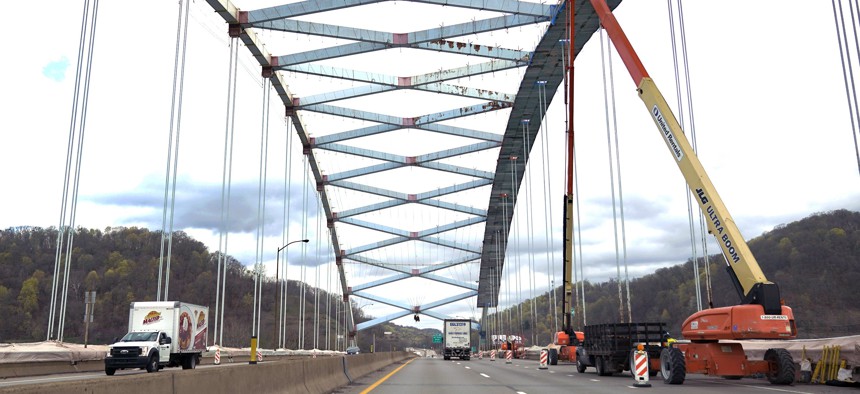Republicans Unveil $568 Billion Infrastructure Proposal

Work continues on the Neville Island Bridge preservation project near Pittsburgh on Friday, April 9, 2021. The bridge carries Interstate 79 over the Ohio River. AP Photo/Gene J. Puskar
GOP senators said that they’re ready to engage with Democrats and the Biden administration to work out a deal.
Senate Republicans laid down a marker on infrastructure spending Thursday, unveiling a proposal to invest $568 billion in the nation’s public works over five years, and emphasizing that they are ready to negotiate a deal with the Biden administration.
While Sen. Shelley Moore Capito, of West Virginia, billed the plan as “the largest infrastructure investment that Republicans have come forward with,” it is well short of the roughly $2 trillion infrastructure and jobs package President Biden has put forward.
Republicans are also showing little willingness to go along with the White House plan to pay for infrastructure spending by raising taxes on corporations, instead voicing support for “user fees,” and shifting around money that is appropriated.
One lawmaker also said that state and local governments would need to “contribute their fair share” for projects.
On the upside for infrastructure spending proponents, the proposal is a sign that Republicans are willing to engage, at least to some degree, with Democrats on legislation that would pump new federal dollars toward roads, bridges, transit, waterworks and sewer systems.
"We're ready to sit down and get to work,” said Capito. “This is important to us."
White House press secretary Jen Psaki said that the Biden administration does see the Republican framework as a legitimate starting point for discussions. "The president has said from the beginning that he would welcome any good faith effort to find common ground," she said.
The GOP plan would devote $299 billion to roads and bridges. There’s $65 billion for broadband, $61 billion for transit, $44 billion for airports, $35 billion for water and wastewater and $20 billion for rail. The plan calls for spending on safety, water storage and ports as well.
Capito emphasized that broadband investments are an essential part of the Republican platform.
Biden’s proposal came under fire from Republicans for its cost and scope. Critics argue that parts of the plan strayed too far from traditional infrastructure, veering into areas like climate policy and expanding care for people who are aging or who have disabilities.
“We’re talking about core infrastructure,” said Sen. John Barrasso of Wyoming.
Along with Barrasso and Capito, Sens. Roger Wicker, of Mississippi, Pat Toomey of Pennsylvania and Mike Crapo of Idaho took the lead rolling out the proposal. Each is the top Republican on committees that deal with infrastructure and finance issues.
When it comes to funding, Capito stressed that Republicans want the plan be “fully paid for” so it does not add to the nation’s debt.
While they raised the possibility of user fees, Capito said that does not mean a gas tax hike and instead suggested raising more money from fees or taxes on electric, hybrid, or hydrogen-powered vehicles. A mileage-based fee is another possibility, she mentioned.
The lawmakers who outlined the plan also endorsed repurposing unspent money Congress has already appropriated, including emergency coronavirus funding approved over the past year.
And they made clear that they support changing guidelines for the state and local aid provided under the American Rescue Plan, so that states, cities and counties might put that money toward spending on public works, or required matching for federal infrastructure funds.
Toomey noted that some state and local budgets have fared better than first expected during the pandemic and highlighted the hundreds of billions of dollars in virus relief funding that the federal government is directing to states and localities.
"Many state and local governments are flush with cash,” he said. “Asking them to contribute their fair share towards infrastructure makes a lot of sense.”
Comments like that are unlikely to sit well with some state and local leaders eager for more federal investment in public works.
While state budgets generally weren’t hit as badly as anticipated by the virus, some states are dealing with financial difficulties and the financial outlook for cities and counties is uncertain.
States and localities already outspend the federal government on core infrastructure programs. Over three-quarters of the $441 billion in public spending on transportation and water infrastructure in 2017 was state and local, according to the Congressional Budget Office.
Biden’s plan calls for major spending on vehicle electrification. Capito indicated that while the Republican framework didn’t specifically refer to electric vehicles, some, but not all aspects of what the president has proposed, could make it into a bipartisan bill.
“I think we fully expect,” she added, “when we get to the negotiating phase that climate will be a part of the discussion.”
Asked Thursday afternoon about the idea of imposing new fees on electric vehicles drivers, Transportation Secretary Pete Buttigieg reiterated Biden's pledge to not put forward a plan that would increase taxes for people earning less than $400,000 a year.
"That's the starting point," he said.
Bill Lucia is a senior reporter for Route Fifty and is based in Olympia, Washington.
NEXT STORY: 3 questions to ask for a successful digital transformation






